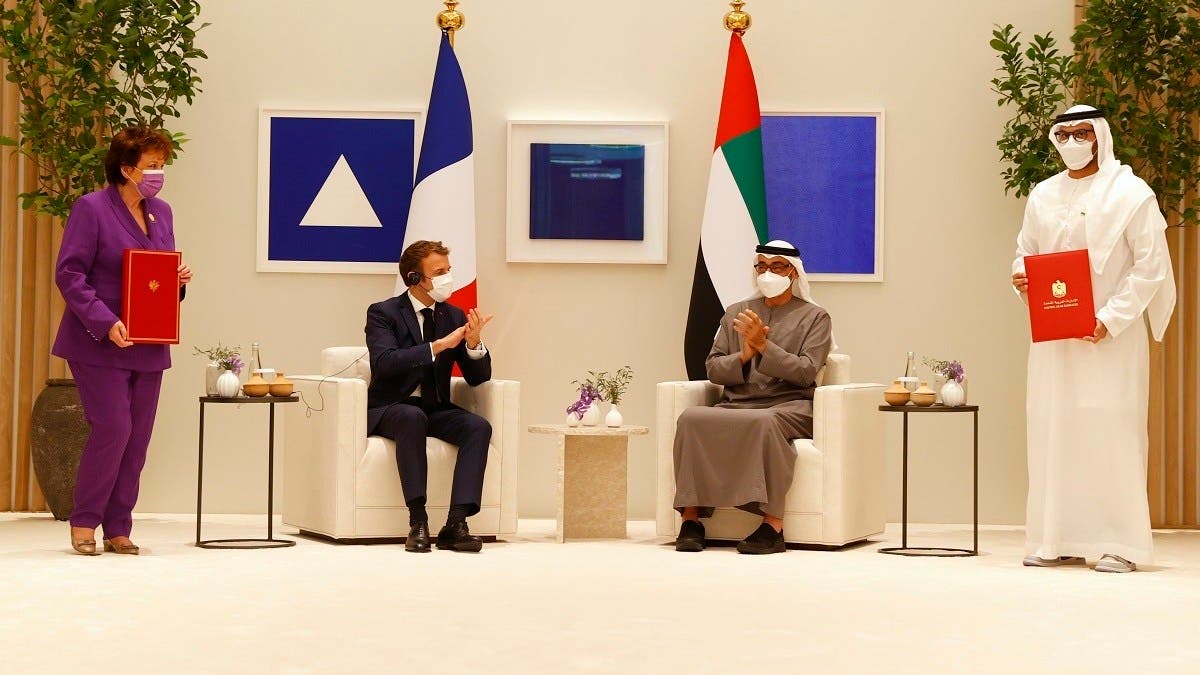The United Arab Emirates ordered 80 Rafale fighter jets and 12 military helicopters on Friday, deepening economic and political ties with France through an arms contract worth 17 billion euros ($19.20 billion).
The largest ever overseas sale of the French warplane was sealed as French President Emmanuel Macron began a two-day trip to the Gulf, during which he will also visit Qatar and Saudi Arabia.
For all the latest headlines follow our Google News channel online or via the app.
“This contract is historic,” French Armed Forces Minister Florence Parly said in a statement.
The French presidency said deal, signed at a ceremony between Abu Dhabi Crown Prince Sheikh Mohammed bin Zayed al-Nahyan (MBZ) and Macron on the sidelines of the Dubai Expo 2020, is worth $19 billion.
“This contract cements a strategic partnership that is stronger than ever and directly contributes to regional stability, the French presidency said in a statement.
Macron’s visit comes at a time when Gulf Arab states have voiced uncertainty about the United States’ focus on the region even as they seek more weapons from their key security ally.
The French leader has forged a good relationship with MBZ with investments flowing between the two countries. Paris has a permanent military base in the Emirati capital.
Shares in Dassault Aviation SA , the Rafale’s maker, rose more than 9 percent.
It is the biggest bulk purchase of the Dassault-made Rafale, other than by the French army, and comes after deals in Greece, Egypt and Croatia this year.
Abu Dhabi also ordered 12 Caracal helicopters. It is the French code name for the H225M, the multirole military version of the Super Puma.
The on-off negotiations for the Rafale fighter jets took more than a decade with Abu Dhabi publicly rebuffing France’s offer to supply 60 Rafale jets in 2011 as “uncompetitive and Unworkable.” Abu Dhabi already has French-built Mirage 2000 warplanes.
Defense sources said the Rafale would replace the Mirage 2000 fleet but is unlikely to displace the American-built F-35 as the UAE continues to hedge its security with two major suppliers, France and the United States.
The deal could nonetheless be seen as a signal of impatience as the US Congress hesitates on approving an F-35 deal amid concerns about the UAE’s relationship with China, including the prevalence of Huawei 5G technology in the country.
UAE order of 80 Rafale will support 7,000 jobs in France
The 80 Rafale fighter jets order by the United Arab Emirates will directly support 7,000 jobs in France and guarantee the supply chain of the Dassault Aviation made aircraft until the end of 2031, a French official told journalists.
He also said the UAE deal, the largest order ever for the warplane, would lead to an increase of the monthly Rafale warplane production.
Read more:
UAE National Day: 26 most important milestones in the country’s 50-year history
UAE establishes $10 bln fund to support investments in Turkey
UAE announces $10 billion investment fund for Israel across multiple sectors

 World2 years ago
World2 years ago
 World2 years ago
World2 years ago
 Entertainment7 years ago
Entertainment7 years ago
 World7 years ago
World7 years ago
 Entertainment7 years ago
Entertainment7 years ago






